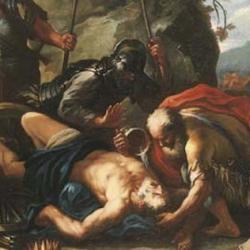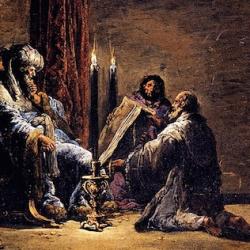Ahab of Israel pops into Chronicles for the first time in 2 Chronicles 18. Readers of Chronicles don’t know the background that 1-2 Kings provides—about Ahab’s father Omri, about Baal worship and the temple of Baal in Samaria, about Ahab’s marriage to Jezebel.
Careful readers of Chronicles will notice something amiss. We’re already alerted to suspect the kings of Israel. Jehoshaphat leaves Jerusalem to visit Ahab in Samaria (18:2). As William Johnstone points out (1 & 2 Chronicles, 2.83), things never go well in Chronicles when Davidic kings leave home. The chosen kings belong in the chosen city where the temple has been erected on the place Yahweh has chosen.
Ahab prepares a huge feast. It might be no more than an elaborate state dinner, but the verb zavach (“slaughter”) is common in the Old Testament’s liturgical vocabulary. “Ahab slaughtered many sheep and oxen” sounds like a description of a sacrifice on the scale of Solomon’s temple dedication. Such a reading makes sense: Ahab is preparing to go to war, and he wants his god on his side. As the narrative unfolds, we become more and more aware that Ahab’s god isn’t Yahweh. Jehoshaphat has gone down to Samaria to feast at a table of demons.
It’s all part of Ahab’s effort to “induce” or “entice” Jehoshaphat to join his effort to conquer the city of Ramoth Gilead. The verb “induce” is, significantly, the same used to describe Satan’s enticement of David (1 Chronicles 21). That suggests an analogy: Satan : David :: Adab : Jehoshaphat. The analogy is a strong one. David was tempted to muster and count the hosts of Israel as if they were his own hosts, rather than the hosts of Yahweh (see my David’s Pharaoh Moment). David prepares to deploy Yahweh’s armies for his own purposes. And Jehoshaphat does the same. “Will you go with me?” Ahab asks, and Jehoshaphat answers, “I as you, my people as your people” (18:3). But they aren’t his people, and he has no right to send the Lord’s armies to fight for the idolater Ahab.
Jehoshaphat’s decision to join Ahab is also strategically inept. Ramoth Gilead was under the control of Aram (18:30), the same Arameans that Jehoshaphat’s father Asa had helped fund in the previous generation (16:1-6). Asa faced an alliance of Israel and Aram, and so he bribed the Arameans to break their alliance and attack Israel, using treasure from his own house and from the temple. The Aram-Israel alliance turned into a Aram-Judah alliance, and now it’s turning again into a Judah-Israel alliance against Aram. Ahab wants to recover some of the territory that the Arameans seized—territory that the Arameans seized with Judah’s help. Jehoshaphat, whose father helped the Arameans take Ramoth Gilead, is now helping Israel take it back!
The Chronicler’s subtle use of names and titles reinforces the point. Jehoshaphat in-laws himself to Ahab (18:1) and goes to Samaria to visit Ahab who slaughters oxen and sheep for him (18:2). Ahab isn’t called “king of Israel” until Jehoshaphat has been seduced into a military expedition with him (18:3). From that point, there’s a “king of Israel” and a “king of Judah.” In fact, “king of Israel” is used more often in the chapter than the name “Ahab.”
As the descendant of David, Jehoshaphat is the only one with a right to the title “king of Israel.” The Chronicler treats the northern kingdom as an illegitimate rebel state, and Asa’s kingdom included territories in the north (15:8-9) so that he could be called king of “Israel” (15:17). Jehoshaphat’s alliance with Ahab upends that balance, so that the northern king becomes “king of Israel.” Alternately, the Chronicler might be indicating that Jehoshaphat’s alliance with Ahab, an effort at united military action, is precisely what creates the rift between a “king of Judah” and a “king of Israel.” Jehoshaphat treats Ahab as a legitimate king, and so conversely undermines his own legitimacy and the unity of his own kingdom.
Jehoshaphat is ultimately saved from the worst effects of this alliance when he cries out to the Lord in the midst of the battle. But the covenant with Ahab reverberates through several generations, as Jehoshaphat’s son and grandson continue the alliance and are almost swept away in Jehu’s purge. Jehoshaphat’s betrayal of Yahweh, and of his own status as Davidic king, nearly destroys the dynasty.











